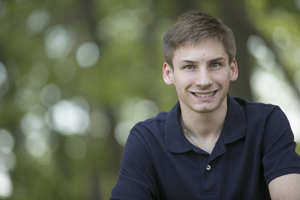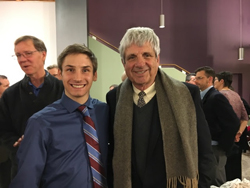Researcher of the Month
June 2017
Andrew Kumpfbeck
Biomedical Engineering major, Class of 2018
Research Mentors: Dr. Joav Prives, Dr. Holly Colognato, Pharmacological Sciences; Dr. Mary D. (Molly) Frame, Biomedical Engineering

When Andrew Kumpfbeck signed up for his freshman seminar (LDS 102) on Drug Discovery in spring 2015 with Dr. Joav Prives, he did not foresee the impact this choice would have on his undergraduate career. But after listening to his Pharmacology professor talk about his research on the regulation of surface receptors in muscle cells, Andrew became motivated to inquire about joining his professor’s lab – which he did the summer after his freshman year, and where he has thrived in the research environment.
Just recently, Andrew was selected to receive a URECA summer fellowship to support his research in the Prives laboratory – which will be a collaborative project with the group of Dr. Holly Colognato (also of Pharmacological Sciences), and involves the “Regulation of Muscle Stem Cell Differentiation via Notch and Dystroglycan Interaction.” He hopes that the work will provide insight as to whether dystroglycan modification will be a potential tool to augment muscle regeneration and to counteract the effects of muscle disease such as muscular dystrophies. Andrew also joined a second research group in the fall of 2016, working with Dr. Molly Frame (Biomedical Engineering) on a cardiovascular research project involving “Blood Flow in a Partially Ligated Model of Inferior Vena Cava Deep Vein Thrombosis,” a project he presented recently at the URECA annual research symposium.
Andrew is a BME major and is currently in the process of applying to medical school. He is an active participant in the University Scholars program, will serve as the University Scholars Peer Assistant Leader (PAL) Coordinator, and has been a panelist for a Scholars event showcasing beyond the classroom experiences. He has also worked as an Orientation Leader, an Orientation Team Leader, and has served as a Teaching Assistant for Organic Chemistry, BIO 202 (Fundamentals of Biology) and BIO 207 (Introductory Biology Lab). Andrew shadows Dr. Thomas Floyd, an anesthesiologist at SB University Hospital; and volunteers at SB Hospital’s Pre-Surgical Admissions; he is also a CEAS Peer Mentor, and a Student Ambassador. Andrew has been recognized a handful of times with the Stony Brook Academic Achievement Award for his 4.0 academic record. A resident of Smithtown, New York, Andrew’s hobbies include piano, biking and camping. Below are excerpts from his interview with Karen Kernan, URECA Director.
The Interview:
Karen. What is your current URECA research project about? How did you get involved Andrew. I’ve been working in the Prives lab since May 2015. My summer project is to assess
the differentiation profiles of muscle stem cells with altered dystroglycan expression,
testing how muscle stem cells proliferate and differentiate into new muscle progenitor
cells or myoblasts. My project will focus on looking at the interaction between dystoglycan
and Notch. We are collaborating with Dr. Colognato’s lab, which published a paper
in Cell that Notch does interact with dystroglycan and it regulates neural stem cells going
from stem cell state to a differentiated state. We’re looking at that same interaction
but in muscle. I’ll be working directly with Dr. Prives and Dr. Colognato on experimental
design and learning techniques for my project.
Andrew. I’ve been working in the Prives lab since May 2015. My summer project is to assess
the differentiation profiles of muscle stem cells with altered dystroglycan expression,
testing how muscle stem cells proliferate and differentiate into new muscle progenitor
cells or myoblasts. My project will focus on looking at the interaction between dystoglycan
and Notch. We are collaborating with Dr. Colognato’s lab, which published a paper
in Cell that Notch does interact with dystroglycan and it regulates neural stem cells going
from stem cell state to a differentiated state. We’re looking at that same interaction
but in muscle. I’ll be working directly with Dr. Prives and Dr. Colognato on experimental
design and learning techniques for my project.
Dr Prives was my instructor for LDS 102, a freshman seminar on called Drug Discovery.
I became interested when he talked about his research on muscle...so at the end of
the semester, I approached him about joining his lab. Soon after, I started off in
the lab. At about the same time, I started working as an Orientation Leader. And on
my days off I would go to lab and would do mostly cell culture – just learning sterile
techniques, replacing growth medium to keep fresh medium on the cells, etc…
And you’re also now involved in a second research laboratory?
Yes, I joined Dr. Frame’s lab in October of last year. We’re looking at blood flow
in the inferior vena cava – the largest and easiest vein to isolate in the mouse.
Basically, what I measure, using an ultrasound probe, is the blood flow during the
clotting response we induce by partial ligation. Our lab collaborates with another
lab in BME, Dr. Yin’s lab, which also is looking at clotting kinetics--the different
steps that occur in the clotting process based on concentrations of clotting factors
and speeds of the reaction. The project I presented at URECA in April was from the
work I did in the Frame lab.
Prior to starting in the Prives lab in freshman year, did you have any previous research
experience?
No, nothing formal. I had friends taking science research class in high school but
I didn’t get involved with it or as a high school research intern at the University.
I wish I had got involved earlier. I really like research, I like doing the work.
How difficult is to come in as a newcomer, and to figure out your way in the lab environment?
You work alongside other people who know what they’re doing and they teach you. I’m
more of a hands on learner. So I like lab because I get better over time. If someone
just teaches something in theory, I know the steps but I question myself more than
I have when I’ve learned it by actually getting to do it. And in lab, you learn new
things all the time. Right now, I’m learning a new technique for my current URECA
summer project project, where I’m coating dishes where we plate cells with different
protein environment. Dr. Colognato and Dr. Prives are there over my shoulder guiding
me with what I need to do. And when you learn by doing – it’s kind of like muscle
memory – it’s more effective than just reading through a procedure.
What do you most enjoy about research?
I like analysis, being able to actually visualize what your results are, what you’re
looking at. When I’m making figures for the blood flow data, for example, I get to
see a line graph where you see the blood flow decreasing over time. I took BME 212
in spring 2016– it’s a biomedical engineering research fundamentals class. And it’s
all about experimental design and statistical testing. I think I learned the most
from that class about being able to analyze results and how to think about what tests
to use, or how I would set up an experiment.
Will your research background be helpful in your future career?
Definitely. I’m planning to go to medical school. And most of my research is applied
and has applications that affect healthcare (be it muscle repair; or clotting, a major
issue among cardiovascular diseases.) The research I have done has also helped make
me knowledgeable about future areas I’d like to be involved with, for example cardiovascular
pharmacology.
What advice to you have for other undergraduates?
Email as many professors as soon as you can. Getting involved earlier is better, I believe. It enables you to develop more of
a relationship with your professor. Having them know you from the start when you don’t
know so much I think lets them see your growth – and what you’ve learned from your
experience with them. I’ve been lucky to have great mentors. My first mentor, Dr.
Prives, has often helped me in ways beyond the actual research experiment--with giving
me advice about summer programs, what and where to apply to. He always likes to ask
about our lives outside of research. It’s nice to have someone who also cares about
you as a person.
Are there any qualities you think are important for doing well in research?
Stick with it. At first, you won’t be directly involved in a project. You will have
a lot of learning to do. What you need to remember is that all of this learning will
eventually go towards the project but you have to learn techniques, and learn what
the project is about before you really work on it. You need to make sure you don’t
lose the big picture.
I know some students just want to start and jump into the project right away. But there’s a bunch of things you have to do before you’re able to really contribute. You have to prep –and stay motivated by what you’re learning. Even learning how to read a scientific paper can be frustrating in the beginning. Again, having an idea of the big picture and keeping that in mind can help you to get through it. When I first started, I didn’t know any of the terms. But Dr. Prives would take me through it, one paragraph at a time.
Did you enjoy presenting at URECA?
I liked it, it was fun --although I was a little intimidated when Dr. Robbins came
over and introduced me to the Provost.
Is it difficult to explain your work to someone not in the field?
It is difficult but it is also something that I like doing. Even from my experience
of applying for fellowships and going through revisions, I’ve become better at using
laymen’s terms to explain the work I’m doing. I think it’s important for everyone
who’s in science to be able to communicate what their research is about, something
everyone needs to work on.
We had an interesting exercise with this in a quantitative physiology BME class I took, where for our final project we had to speak to our audience as a patient or a family member of a patient. We had to explain what was happening on the cellular level, how to explain the tests you were going to do – things like that. It was challenging but also useful and helpful to work at it. I’m not an expert – but explaining a topic, learning how to get others to understand something more clearly is very satisfying. It's something I enjoy about being a TA as well.
When you first came to SB, did you expect to be so involved in research?
It wasn’t a deciding factor of attending Stony Brook. It’s something I got involved
in once I came here, something new that I definitely wanted to try in college. And
something I stuck with because I liked it.
